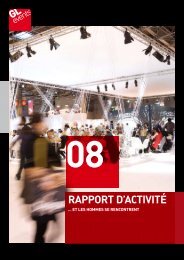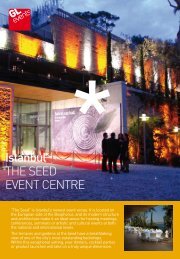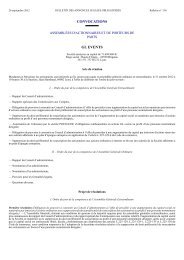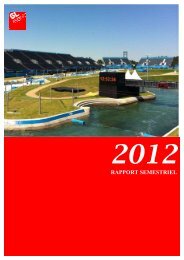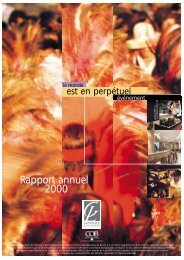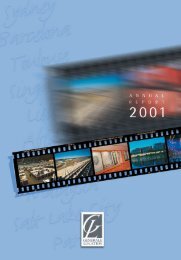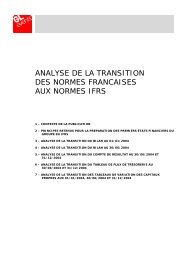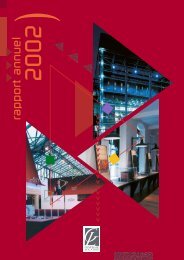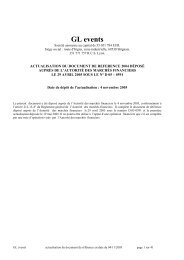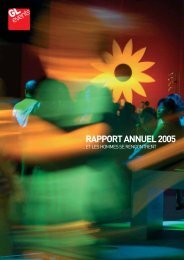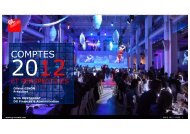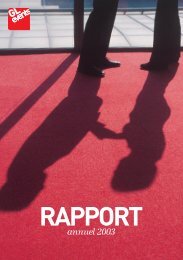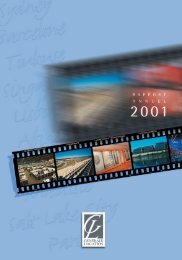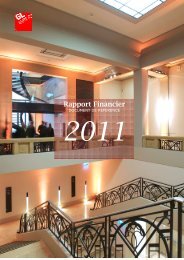l'enjeu majeur De l'événementiel - GL events
l'enjeu majeur De l'événementiel - GL events
l'enjeu majeur De l'événementiel - GL events
You also want an ePaper? Increase the reach of your titles
YUMPU automatically turns print PDFs into web optimized ePapers that Google loves.
Cover story.23<br />
Patronage<br />
Charles Hedrich:<br />
An adventurer<br />
supported by<br />
<strong>GL</strong> <strong>events</strong><br />
As part of the company’s patronage<br />
operations, <strong>GL</strong> <strong>events</strong> is providing<br />
support for the sportsman and<br />
adventurer, Charles Hedrich, in his<br />
latest challenge. Charles Hedrich hails<br />
from Lyon and has set himself the<br />
challenge of going around the world,<br />
via the North and South Poles, using<br />
only renewable energy sources..<br />
> Hedrich is a fan of unusual sports<br />
<strong>events</strong> and has just done a world’s<br />
first: since 6 June, he and his<br />
colleague, Arnaud Tortel, have become the first<br />
men to ever travel from the North Pole to<br />
Greenland using only pulkas and kayaks. The<br />
original plan for this 51-year-old Lyonnais,<br />
father of three boys and a former officer in the<br />
Merchant Navy, was to travel from the North<br />
Pole to the South Pole using only renewable<br />
energy sources such as wind, water and solar<br />
energy. He set out from the North Pole in early<br />
April and planned to reach the South Pole in<br />
early January 2010. “This has never been done<br />
before, it will be a world’s first,” he says. But<br />
the weather conditions made it impossible for<br />
him to cross Greenland. “Global warming is<br />
such that we came across an open ice floe, as<br />
far as the eye could see. This was totally<br />
unexpected, including for the ice specialists<br />
who were monitoring our progress…”, says<br />
Charles Hedrich. With his iron will, this highly<br />
unusual sportsman decided that he would not<br />
let this stop him. He will take up his expedition<br />
again in April 2010, starting from where he<br />
stopped last time and still without using the<br />
slightest amount of fossil fuel. “Doing this trip<br />
in two stages is, of course, less exhilarating for<br />
me, but I’m trying to look at it as just a stopover…”.<br />
This is a man who is used to seeing<br />
challenges through to their conclusion. Since<br />
devoting himself to extreme sports in 2002<br />
following the sale of the company that he<br />
succeeded in floating on the stock market in<br />
1997, he has been incredibly active. After the<br />
Paris-Dakar motorcycle race in 2003 (6 th place<br />
in the 400 m 3 category), he sailed solo around<br />
the world, with no stop-overs and no assistance,<br />
in 2005. Then, on 17 May 2006, he climbed<br />
Mount Everest and its 8,848 metres using the<br />
Tibetan route. More recently, in January 2007,<br />
Charles Hedrich beat the world record for<br />
rowing across the Atlantic, in 36 days and 6<br />
hours, before doing a 550 km solo autonomous<br />
hike, at the end of 2008, in Antarctica. With the<br />
support of his various partners, including<br />
<strong>GL</strong> <strong>events</strong>, who were one of the first and who<br />
have invited him to share his experiences at the<br />
renewable energy sources trade show, Charles<br />
Hedrich shows no sign of stopping now.<br />
For further information:<br />
www.charleshedrich.com.<br />
Interview with<br />
Nicole Notat<br />
CEO of Vigeo<br />
“Sustainable development is not<br />
synonymous with restrictions, but<br />
rather with opportunities”<br />
Nicole Notat is the former secretary<br />
general of one of France’s most<br />
important trade unions, the CFDT.<br />
Today, she is the CEO of Vigeo, a<br />
corporate responsibility rating agency,<br />
which audits the largest French<br />
and European companies in terms<br />
of their Social and Environmental<br />
Responsibility (SER). This privileged<br />
observation point provides her with<br />
a unique overview of the sustainable<br />
development situation in France.<br />
Interview.<br />
><br />
When and how did the world<br />
of business really encounter<br />
the question of sustainable<br />
development?<br />
Nicole Notat – For me, the trigger was in 2002,<br />
in Johannesburg, during the World Summit on<br />
Sustainable <strong>De</strong>velopment. At this summit, the<br />
environment, social inequality and economic<br />
development were all at the forefront of public<br />
opinion. And it was at the same event that<br />
Kofi Annan, the then Secretary General of<br />
the United Nations, started to put pressure<br />
on businesses and that businesses started to<br />
feel concerned about such matters. Especially<br />
those that are most exposed, who understood<br />
that if the question of sustainable development<br />
was ignored, they were the ones who would be<br />
shot down by public opinion or the media.<br />
Out of conviction, or out of necessity, the<br />
world of business thus started to move. It was<br />
all the more inclined to do so as regulatory<br />
pressure gained momentum at the start of<br />
the 2000s, for example with the “loi NRE” (new<br />
economic regulations law), which has obliged<br />
all companies listed on the Stock Exchange<br />
to publish information concerning their SER<br />
policy.<br />
You just mentioned “SER”. What exactly<br />
do these three letters stand for?<br />
NN – In the face of the challenge that<br />
sustainable development represents for the<br />
planet and our future generations, it is now<br />
necessary to invent and build a new economy<br />
and a new type of growth. Collectivities,<br />
companies, citizens, consumers, everyone is<br />
involved and every individual should commit to<br />
the concept. For companies, this commitment<br />
takes the concrete form of what is known<br />
as Social and Environmental Responsibility<br />
(SER). At Vigeo, we still insist on the fact that<br />
companies must not consider this process<br />
as a restriction, but rather as an opportunity.<br />
Similarly, we also insist on the fact that SER<br />
should not be seen as a “good deed”, but<br />
instead as a boost for global performance.<br />
Do you feel that progress is being<br />
made in this respect?<br />
NN – Absolutely! In the early 2000s, a<br />
company’s approach to SER was often limited<br />
to nothing more than a “Values charter”.<br />
With the company’s values thus displayed<br />
in black and white, everyone assumed that<br />
the corresponding actions would follow. Of<br />
course, we all know that things do not happen<br />
as easily as that. Since then, a new level has<br />
been attained by many companies, who have<br />
integrated sustainable development into the<br />
very heart of their strategy, their production<br />
processes and their organisation. The fact that<br />
the employees themselves have also adhered<br />
to the importance of sustainable development<br />
has also played a part in this evolution.<br />
To conclude, what message would you<br />
like to send to company directors<br />
who have a vague desire to commit<br />
themselves to an SER approach?<br />
NN – To start with, and at the risk of repeating<br />
myself, all company directors should bear in<br />
mind that committing to this approach will<br />
provide opportunities in terms of development,<br />
performance, reputation or attractiveness with<br />
regard to the various publics concerned.<br />
That said, they should also be aware that<br />
sustainable development is not a magic potion.<br />
In other words, things will not all come together<br />
harmoniously overnight. There will necessarily<br />
be trade-offs to make, certain types of rigidity<br />
to overcome, projects that will need to be<br />
staggered over time, and so on. Finally, although<br />
the directors’ commitment is decisive for the<br />
success of the approach, implementing real<br />
“SER management”, which can, in particular,<br />
involve the creation of specially designated<br />
missions, and appropriating teams (at all levels<br />
of the hierarchy) are also essential conditions<br />
for success.<br />
Respect<br />
the Earth<br />
Charles Hedrich aims to be honest in his<br />
approach. He is, above all, an extreme<br />
sportsman. For him, environmental<br />
concerns come in second place. But rowing<br />
across the Atlantic in 2008 was a sort of<br />
trigger: “When you see all the plastic bags<br />
in the sea, when you realise that there are<br />
less and less fish, you have to have some<br />
kind of reaction. I want to keep on doing my<br />
own thing and not become over-zealous,<br />
but, through my sporting activities, I have<br />
the opportunity<br />
to raise people’s<br />
awareness of<br />
what is really<br />
happening to our<br />
planet today.”<br />
With his association, “Respectons la Terre”,<br />
Charles Hedrich has thus decided to use<br />
adventure sports as a means of approaching<br />
issues of a more general nature, such as the<br />
use of natural or renewable energy sources,<br />
preserving plant and animal biodiversity,<br />
and so on.<br />
For further information:<br />
www.respectonslaterre.org<br />
Octobre/October 2009 - <strong>GL</strong> <strong>events</strong> magazine



